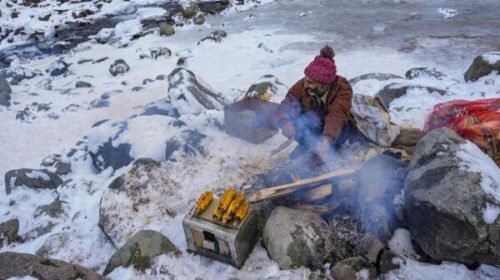The Jammu and Kashmir Lake Conservation and Management Authority (LCMA), during the ongoing cleaning of Dal Lake on Thursday, discovered a rare kind of fish for the first time, which is said to be an “Alligator Gar” fish.
Known for its crocodile-like head and razor-sharp teeth, ‘Alligator Gar’ fish is native to North America.
Masood Ahmad, an expert from J&K LCMA’s research and monitoring department told the news agency—Kashmir News Observer (KNO) said that they are going to conduct the analysis of the discovered fish with the help of fisheries and SKUAST-K’s fisheries department.
“We are going to seek help from the fisheries department and SKUAST-K so as to find out the effects of this type of fish on our existing fish species inside the Dal Lake,” he said.
The official said that during the normal de-weeding routine in Dal Lake, they found a rare kind of fish on the conveyor. “It was the first of its kind here,” he said.
Videos of the rare fish found during the cleaning of the Dal Lake went viral on social media, where the fish was displayed and exhibited. The netizens expressed surprise with many saying that the fish type is an invasive specie and a threat to aquatic life.
Speaking to KNO, Dr Farooz Ahmad Bhat, Dean at the Faculty of Fisheries, Sher-e-Kashmir University of Agricultural Science and Technology – Kashmir (SKUAST-K) said the fish that was seen in the Dal Lake is an alligator gar fish, which has been sighted for the first time in Kashmir.
| Install Our App | DOWNLOAD |
| Join Telegram Channel | JOIN NOW |
| Join Facebook Group | JOIN NOW |
| Subscribe YouTube Channel | SUBSCRIBE |
| Follow On Twitter | FOLLOW |
| Follow On Instagram | FOLLOW |
“This fish is not harmful, but we don’t have any research on it as this is the first time it has been seen here in the Dal Lake,” Dr Farooz said.
He said in 2016, grass carp fish were seen here in Dal Lake. “Later, our team also found another in the Mansbal Lake, but this alligator gar has been heard for the first time in Kashmir,” he said, adding, “We will look into how and where it came here in Kashmir and how long it has been here.”
Dr Farooz said that proper research will be done on how it reached here or whether it is dangerous for the local fish varieties in Kashmir











